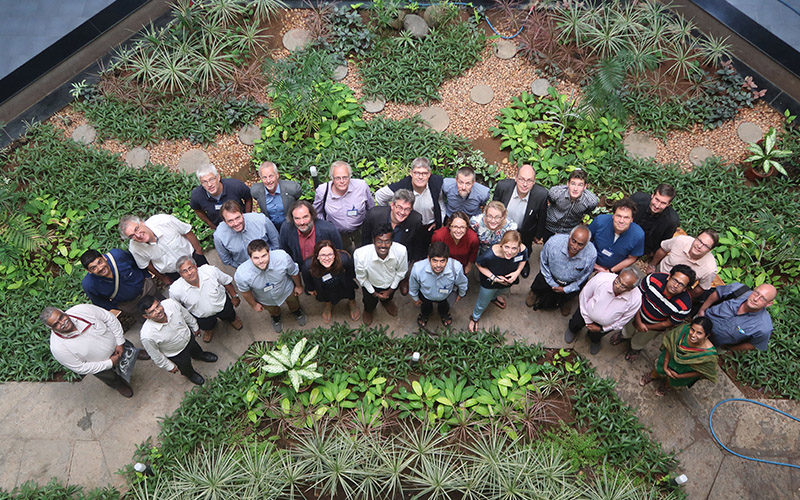Urban Resilience 2: Coastal and River Management, Vulnerability and Sustainability
October 20-23, 2019 at IIT Madras in Chennai
Continuing discussions from 2017 on the influence of climate change on flooding at rivers and coastal areas Indian and German researchers met for the round table Urban Resilience 2. 15 German scientists from Geoverbund ABC/J, under lead of RWTH Aachen University, met a again delegation of Indian researchers at IIT Madras to continue discussions on the influence of climate change on flooding at rivers and coastal areas. Many Indian scientists from different parts of the country were invited, e.g. from IIT Madras, IIT Kharagpur in Golgata; Anna University in Chennai, NIOT & NCCR in Chennai, and Annamalai University in Tamil Nadu.
The presentations covered many highly relevant topics, such as the establishment of the coastal flood forecasting system for Chennai ‘CFLOWS’ after the devastating floods of 2015 and coastal vulnerability and socio-economic effects in large cities after extreme events. This was also discussed in light of distribution patterns and toxicity of various pollutants, e.g. pesticides from agricultural areas in river catchments and coastal areas after flooding events. Other presentations covered the following topics
- Urban and Coastal Resilience
- Climate Change and Coastal/Riverine Flood Hazards
- Bio- and Ecohazards
- Social and Environmental Impacts, Adaption and Governance and its Dynamics
In October 2017, IGCS started a discussion on Urban Resilience on coastal and river floods or extreme events affecting megacities and settlements in coastal low lands. More than 1.5 billion people are currently living within 100 km of the coastal zones of the Earth, especially in tropical and subtropical regions. And the number is still growing, due to economic and social attractiveness as large-scale urbanization and mega-city development within the coastal zone is expected to be more rapid than in other areas in the near future.
Almost all future scenarios of climate change and sea level rise point to a higher frequency of extreme weather and climate events in near future, and that this will reveal significant vulnerability and exposure of coastal cities to the current climate variability. Climate change also affects monsoonal patterns, which seem to cause an intensification of the seasonal rainfall that fortifies inundation/floodings/droughts in India regularly during the last years (e.g. 2015 Chennai, 2018 Kochi).
Besides the Indian coast is prone to tsunamis, as the Makran subduction zone may cause earthquakes and tsunamis affecting the Indian west coast, as e.g. in 1945. In 2004, the east coast has been affected by the Sumatra tsunami inducing landfall in the Tamil Nadu coast. Besides the primary destructive effects, the widespread contamination of coastal areas due to the pulsed transport of immense pollutant loads during the floodings may seriously affect the coastal ecosystems. This clearly affects increasing population and urbanization in particular along coastlines and urban or even critical infrastructure, as a consequence adaptation, decision analysis and governance of manifold administrational levels.
At the roundtable, many new collaborations for prospective research projects between Indian and German researchers evolved.
Venue
IIT Madras, Chennai, India
Date
October 20 – 22 2019 (until October 25 incl. excursion to Pichavaran )

